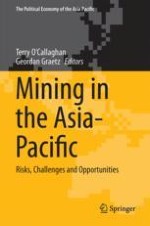2017 | Supplement | Chapter
6. Security of Resource Supply and the Obsolescing Bargain
Author : Tom Johnson
Published in: Mining in the Asia-Pacific
Publisher: Springer International Publishing
Activate our intelligent search to find suitable subject content or patents.
Select sections of text to find matching patents with Artificial Intelligence. powered by
Select sections of text to find additional relevant content using AI-assisted search. powered by
